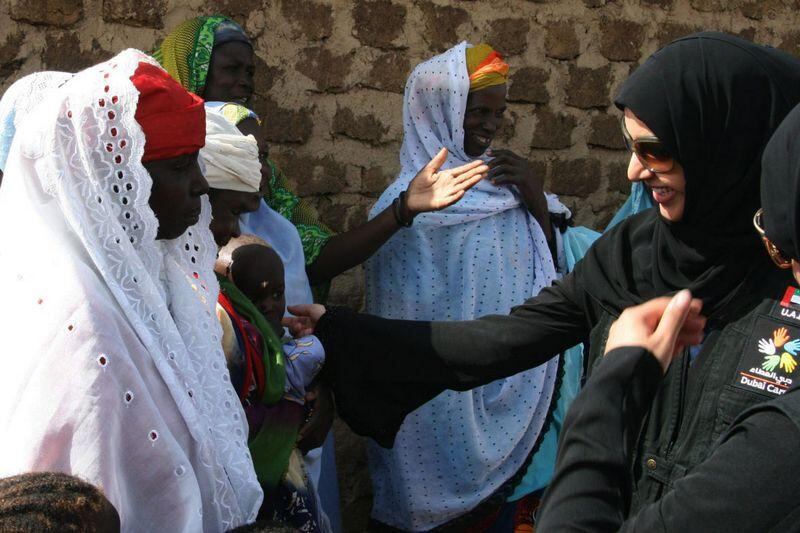As its name suggests, Dubai Cares is intent on making a difference. The philanthropic organisation founded by the Ruler of Dubai has come up with a novel approach to improving education in developing countries. Bradley Hope reports When Dubai Cares launched a campaign to collect one million books for underprivileged children last autumn, Reem Ibrahim al Hashimy knew she was pushing a concept that was new to the country.
"This was not a traditional approach to philanthropy in the UAE," says Mrs al Hashimy, the chairwoman of Dubai Cares and Minister of State. "It was a creative way of getting children to understand the impact of reading. It wasn't just a fund-raiser, it increased awareness." Students were to be the engine. For each book they read, Dubai Cares would buy one and donate it to a school in places such as Yemen, Niger or Djibouti.
Within a few days, books were flowing in by the hundreds of thousands. "It created a bit of a frenzy at the schools," she says. "My nephew read about 40 books. In a normal month, he would barely read a book." In the end, 1,323,218 books were read by 141,425 students from 159 public and private schools across the country. This approach to philanthropy has become the defining feature of Dubai Cares, set up on in September 2007 by Sheikh Mohammed bin Rashid, Vice President of the UAE and Ruler of Dubai. Its goal is to combat poverty in developing countries by increasing access to quality primary education. It has an endowment of more than US$1 billion (Dh3.67bn), half of it coming from Sheikh Mohammed's personal wealth.
The goal was not to create another charitable organisation that gives money to causes. Instead, the aim was to establish a lean philanthropic group that makes strategic donations to get to the root of problems. Rather than simply give money to the likes of UNICEF, the UN children's fund, or Oxfam, members of the team fly to designated locations, meet people and "try to understand the substance of the issues at hand", Mrs al Hashimy says. They also get involved with advocacy and host meetings for various groups to see where there are overlaps.
This can lead to unconventional approaches for improving primary education. This year, Dubai Cares is focusing on water and sanitation with a big push during Ramadan. "In our research, we found that two million children a day don't go to school because of a waterborne disease," Mrs al Hashimy says. "We are not a health-related organisation, but this is what's impeding many children's education." Dubai Cares is working with charities that build clean wells and latrines in communities where people sometimes have to walk a long way just to get a drink.
"In Yemen, we have been building girls' latrines and their involvement in the schools has already increased dramatically," she says. "This is part of a holistic approach to improving education." To make Dubai Cares a lean and efficient organisation, Mrs al Hashimy has opted for a team of fewer than 20 people to work with her in a set of pristine offices at Emirates Towers. This small group is in charge of donating millions of dollars a year and maintaining its $1bn endowment.
"We are not operatives," she said. "We do not have bases in different places. We travel a lot. We are donors, but we try not to be your traditional donor." Compared with the more rigid structure of traditional board meetings in the UAE, those at Dubai Cares are more relaxed affairs with the aim of fostering discussions that could yield novel approaches to the problems they are tackling. "It's very laid back, but not in the sense that we are not serious about the issues," says Ahmed bin Shabib, a board member and founder of brownbook magazine in Dubai. "We try to create an environment where you can find innovative and unique ways of tackling how to make this work."
While the book drive was the event that marked the debut of Dubai Cares as the largest philanthropic organisation devoted solely to primary education in the world, Mrs al Hashimy says a major milestone was the signing of an agreement in April with the Bill and Melinda Gates Foundation to work together on improving health and education in the developing world. "The challenges facing developing countries are far greater than any single government or foundation can overcome alone. Collaboration is critical to success," Mr Gates, who is one of the world's wealthiest individuals and the chairman of Microsoft, said at the time.
In many ways, Dubai Cares is trying to model its operation on the $30.2bn Gates Foundation. Members of the Dubai Cares team have already visited the foundation's offices in Seattle to learn more about how they set up programmes and see them through over a long period of time. They are also studying how they monitor the success of projects through the impacts on students. Dubai Cares learnt that to truly gauge the success of a project, it is important to do more than simply monitor test scores to see how a student progresses year after year.
"They have made this into an absolute science," Mrs al Hashimy said of the Gates Foundation. The fact that Mrs al Hashimy heads Dubai Cares, manages foreign affairs for Sheikh Mohammed's Executive Office and has other duties as Minister of State reflects the dual nature of the organisation. It is a philanthropic endeavour and, at the same time, part of the Government's wider development agenda for poorer countries.





